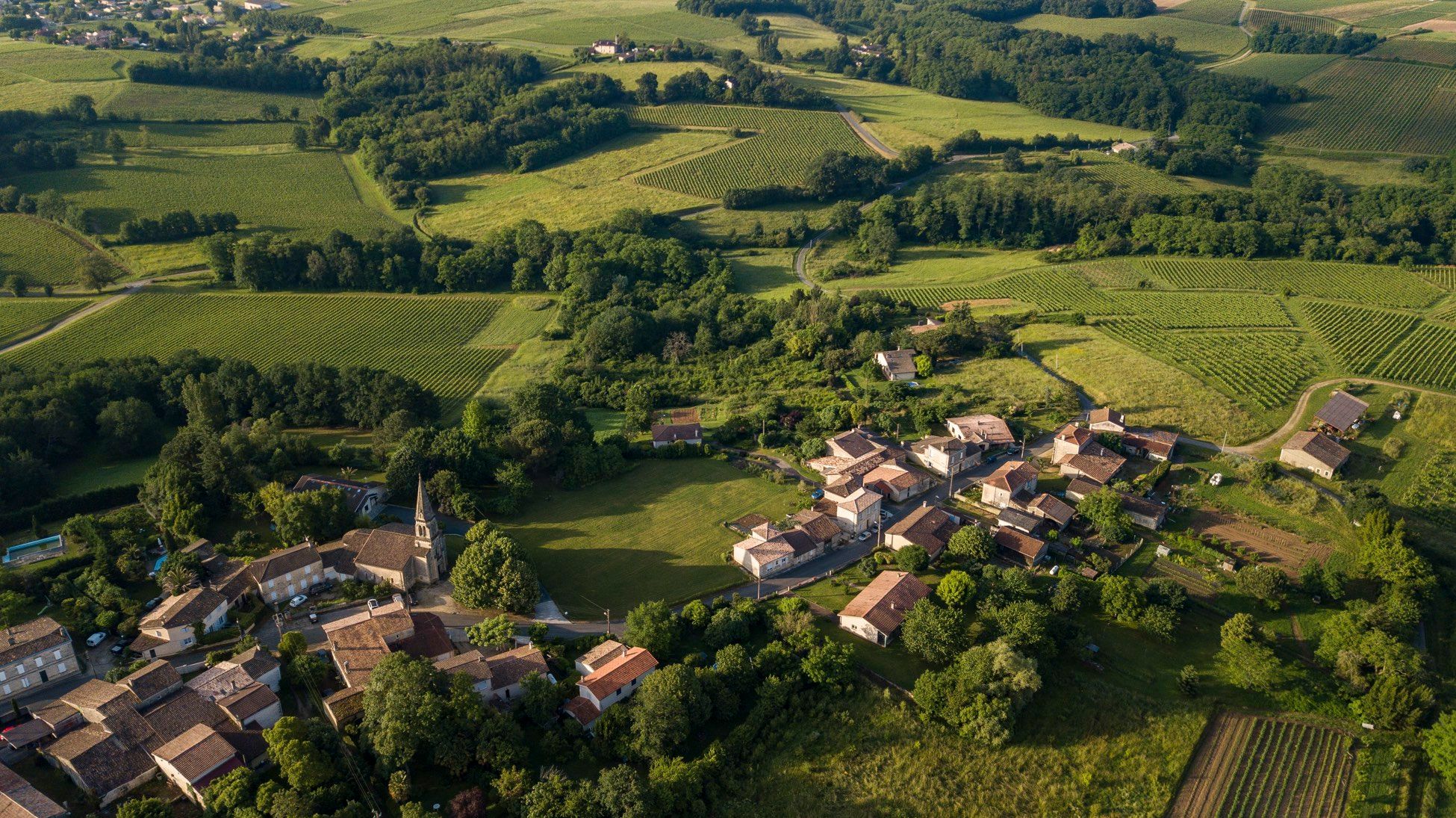Libby Brodie talks to four female winemakers about their approach to winemaking and what impact they hope to make on the overall image of Bordeaux and its wines. (Main image copyright © Favoreat design CIVB).
Emilie Nadau-Esquerre and Château Gillet
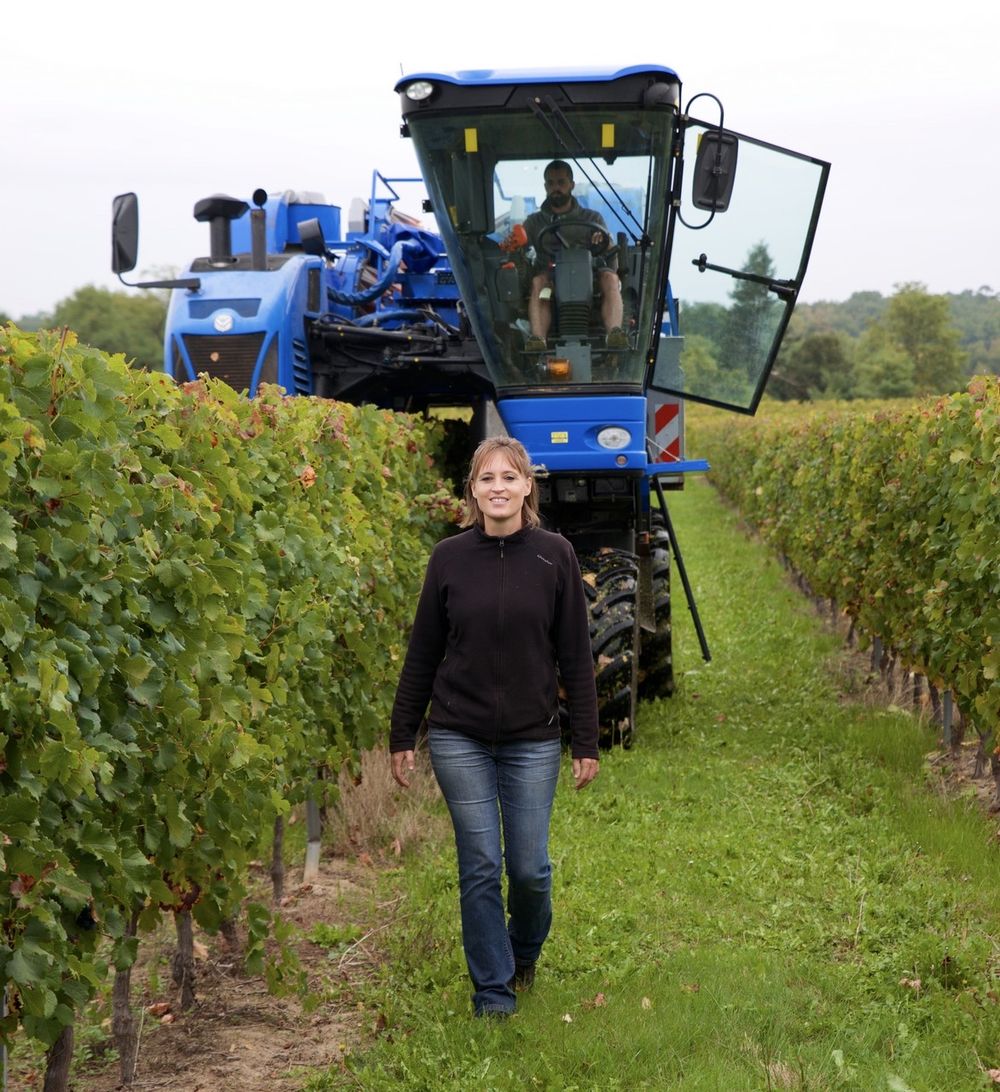
Emilie Nadau-Esquerre is managing the property with her husband Rémy and is a fifth generation winemaker
Emilie Nadau-Esquerre is the manager of Les Vignobles Nadau, a unification of her parents’ respective farms Château Gillet and Domaine de Maucru. Since her parents’ retirement a few years ago, Emilie Nadau-Esquerre and her husband Rémy have managed the business together with Rémy running the technical side in the vineyards and cellar, and Emilie managing the day-to-day production, commercial, relational, social and administrative aspects. Vignobles Nadau export sales have significantly increased and they have developed their environmental regulations, becoming a part of an EMS group in 2013.
Why did you want to be a winemaker?
For the love of the land and agriculture – and because I have been living in this wine world since I was born. I’m the fifth generation of my family so it was natural for me to continue the work of my ancestors.
How did you get into wine and where did you train?
I studied at La Tour Blanche, School of Viticulture and Oenology. I did an internship in Entre-deux-Mers, another one in Saint-Emilion at Château Pavie, then one in the Graves, and finally did my installation internship in Champagne. I then learnt all about the reality of the field on the family farm.
How do you feel about being part of a new generation of female winemakers?
I feel very proud, even if I think that women are not sufficiently promoted.
What has been your biggest challenge?
The challenge of keeping Vignobles Nadau alive after my sister and father left the business. But the greatest challenge is now to overcome the more difficult years we had and hope will have.
What would you say is your biggest achievement so far as a winemaker?
To have been able to impose my own choices and to work in a different way to that of my parents, and also to have invested both personally and financially in export development.
How would you describe the style of wine you make?
A supple, round, perfectly balanced wine with fruity flavours.
What do you think people should know about Bordeaux?
Bordeaux wines are not “has-been” and the well-known grands crus do not reflect the majority of Bordeaux wines, quite the contrary. Bordeaux wines have reinvented themselves over the last few years with profiles that fit the consumer’s taste. All the winegrowers of Bordeaux have questioned themselves, and every effort has been made both in terms of quality and sustainability.
Sophie Guimberteau-Foray and Château Franc Baudron
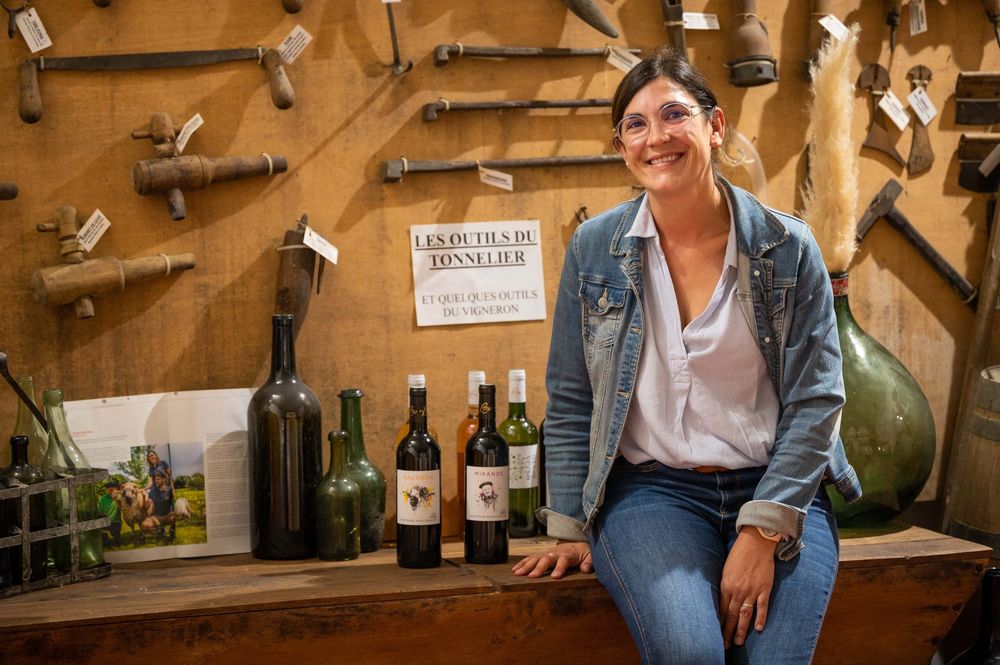
Sophie Guimberteau-Foray has moved her family wine business over to biodynamic production
Château Franc Baudron, in Montagne-Saint-Emilion area, has been in the Guimberteau family since 1923 and today the newest generation, Sophie Guimberteau-Foray, her husband Charles, and her brother Vincent are committed to leaving the land better than they found it. Sophie Guimberteau-Foray has converted all of the vineyard sites to biodynamic viticulture with the goal of eventually bring a completely self-sustaining environment.
Why did you want to be a winemaker?
Love. At the very beginning, when I was teenager, I didn’t want to be a winegrower, but sometimes life brings you back to basics. Most of my training courses during my trade studies happened in the wine sector, so I decided to specialise at the oenology faculty in Bordeaux for a year, where I met the boy who would become my husband. We went to work in the Valais Region in Switzerland for a few months and in Alsace for 5 years and then we decided to make our own wine by taking over my family estate in Bordeaux.
How did you get into wine and where did you train?
I was born in a family estate; all my ancestors were farmers and winegrowers. I grew up with an ocean of vines around me every day. I spent all of my life in the vines and cellar, and every summer as a teenager working in the vineyard. That’s why I decided to choose another profession originally, out of a spirit of opposition and because I wanted to see what was elsewhere. But finally, life and love brought me back to my roots in Bordeaux. I did a degree in international trade and another degree in management of vines and wine at the faculty of Oenology of Bordeaux.
How do you feel about being part of a new generation of female winemakers?
I feel proud to be a part of the renewal of Bordeaux, this is not easy stuff but it’s rewarding to change the practices in the vineyard and in the winery, to modernise both the style of wines and the labels. But honestly, I don’t have the feeling that the wine world is a very masculine environment now. Many women work in wine and more and more are in key decision-making positions!
What has been your biggest challenge?
The biggest challenge for me was to convince my parents to trust us (me, my husband and my brother) and let us prove that we could do things differently without endangering the company. With a little apprehension, they let us convert our 42ha of vineyard to organic farming 12 years ago, and they let us create new cuvées with new and very modern labels. Now, we just need to convince them to change the two oldest labels of the winery, the ones of my father, in time for our 100-year anniversary in 2023!
What would you say is you biggest achievement so far as a winemaker?
My biggest achievement is my three children, because even if our vineyard is a masterpiece in our life, family is also very important. I am happy we are able to work as a family, even if it’s not easy every day. My achievement will be even more successful if they decided to continue the adventure of our family estate. I think this would be good but they are still very young (9,7 and 3) so life may take them in other directions…
How would you describe the style of wine you make?
Our wines are made in our image: authentic and sincere. We favour freshness and fruit in them because we make wines we want to drink. No over-ripeness, no tricks, and only low interventions in the winery to highlight the terroirs. My beloved grandfather Nelson had a saying, “A Wine is the child of the vine. Its personality and maturity reflect the place and year of its birth’. He was a wise man.
What do you think people should know about Bordeaux?
That Bordeaux is a magic place for your palate and your wallet – surely it is the best region in the world to get the best value for your money. People can think that Bordeaux is unaffordable, but what they forget is that there is an incredible number of true winegrowers that are working hard to produce great wines that you don’t need to sell a kidney to buy and enjoy. Also, 75% of the vineyards in Bordeaux are engaged in an environmental approach, of course we always can do better, but we are on the right track.
Virginie Navet and Vignoble Despagne
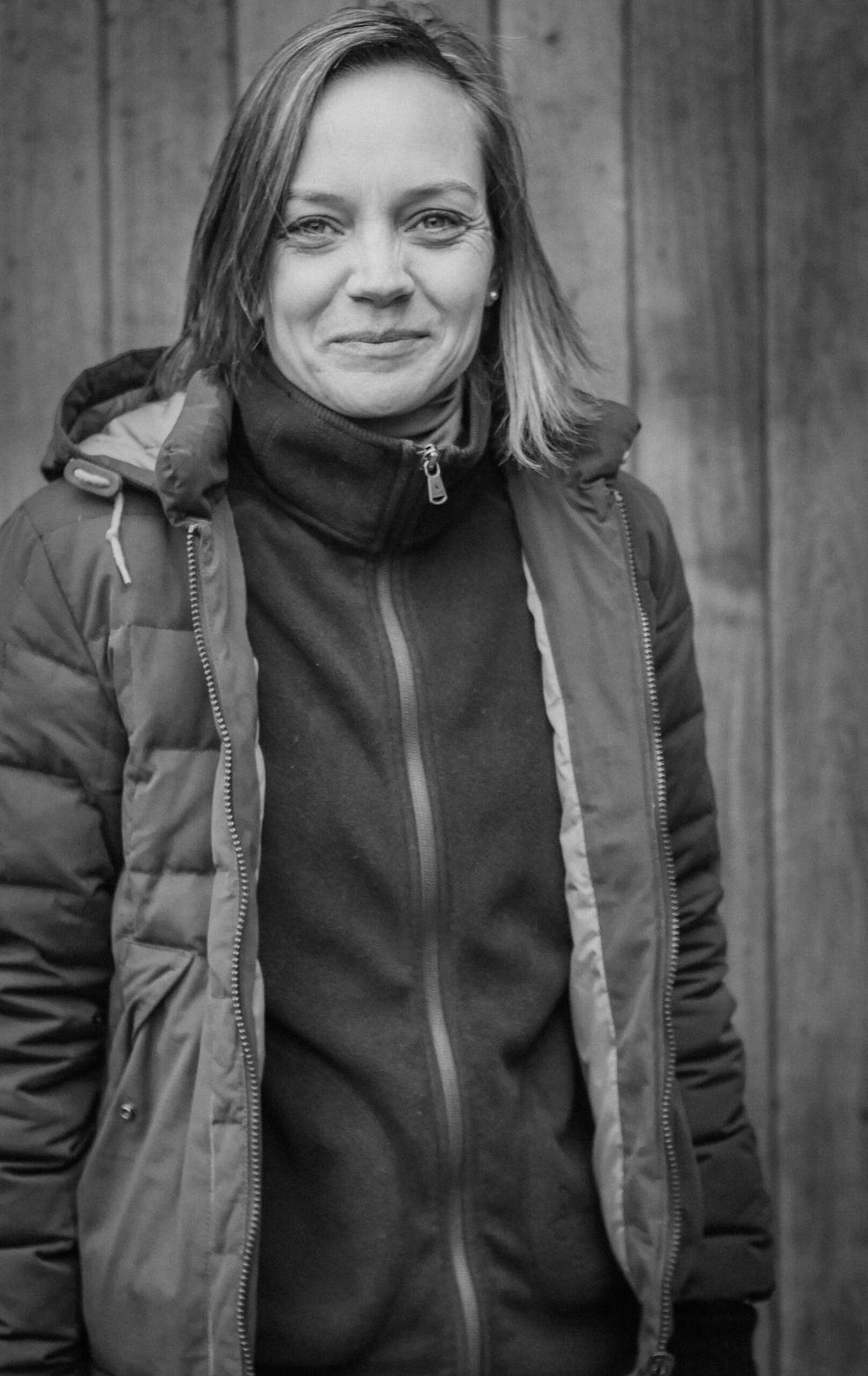
Virginie Navet has been at Vignobles Despagne since 2014 and has helped make its wines more elegant and finessed
Vignobles Despagne have been established in Bordeaux, in the heart of Entre-Deux-Mers, for more than 200 years, with vines handed down mainly by women. Working alongside Basaline Granger, who manages the family business’s administrative and financial side, Virginie Navet joined Despagne in 2014 as oenology manager and was influential in changing the style of their wines to bring elegance, finesse and femininity to the fore.
Why did you want to be a winemaker?
I thought it would be a job that would fulfil me. There is a satisfying completeness to it. I could use science while also having a hands-on job in relation to nature and working with my senses, such as taste.
How did you get into wine and where did you train?
I had a friend who was a Cognac producer in a family business. I spent quite some time over there on the property and so I decided that after my master’s in plant biochemistry it would be the perfect finale to my studies, so I studied Oenology at Bordeaux University.
How do you feel about being part of a new generation of female winemakers?
I have now introduced quite a few women into my team and I have a lot of pleasure in working with young female winemakers from all over the world, during harvest. I am also very grateful to a bunch of male winemakers who trusted me and helped me become the female winemaker I am. I feel proud of this process of transmission.
What has been your biggest challenge?
It was definitely that when I was a young winemaker I needed to acquire enough experience.
What would you say is you biggest achievement to date as a winemaker?
I believe my biggest achievement, with my team, was making a sélection parcellaire of organic wines, on the excellent clay-limestone terroir of Entre-Deux-Mers at Vignobles Despagne.
How would you describe the style of wine you make?
We create wines with a freshness and precision on the nose and a balance on the palate and I would say we have an ethos of ‘minimalism’ when it comes to the winemaking itself.
What do you think people should know about Bordeaux?
Bordeaux wines are not only made by Grand Cru Classés or big companies. Bordeaux wines are also, and mainly, made by winegrowers, winemakers and family-owned estates, who work with humility and perseverance.
Estelle Roumage and Château Lestrille
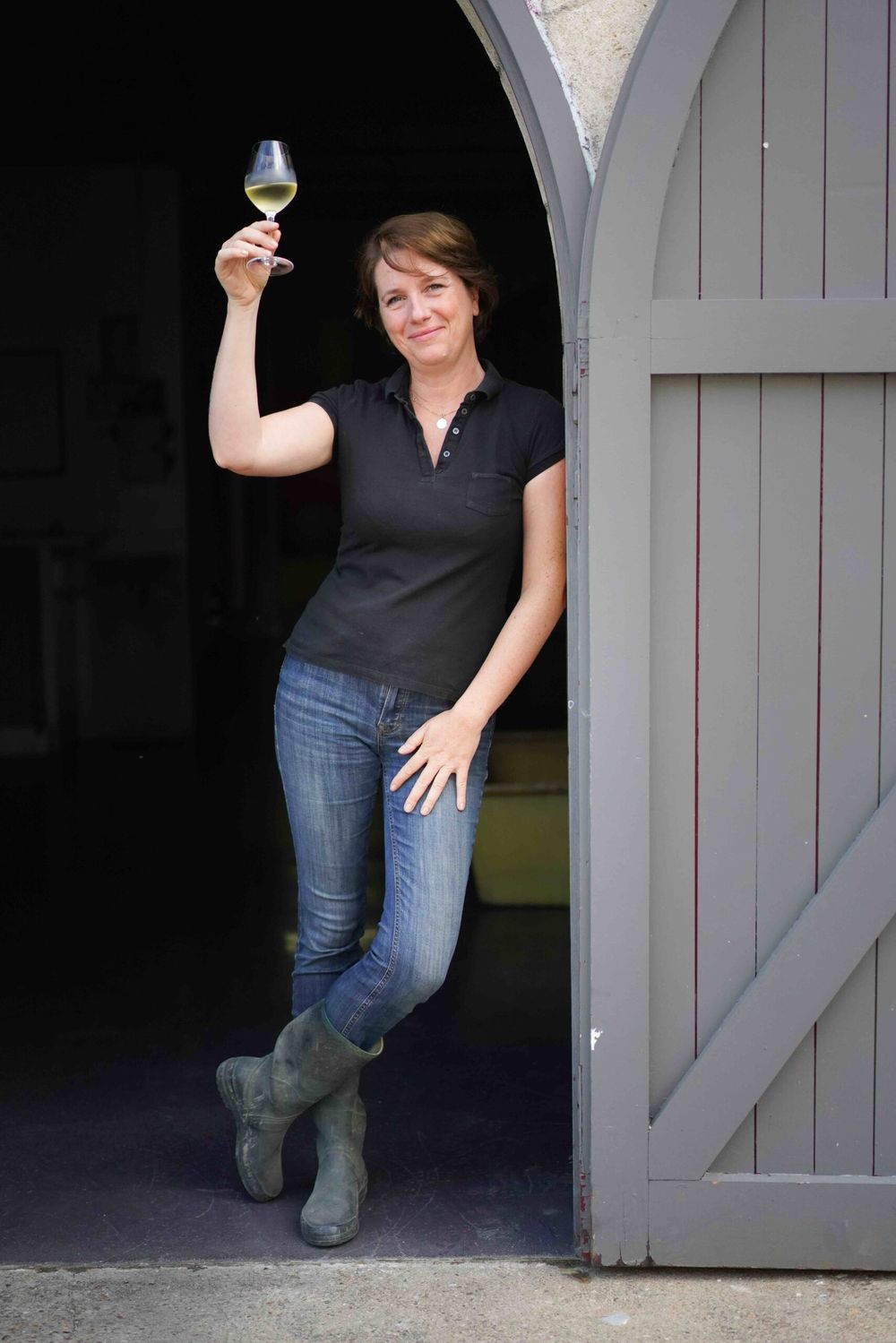
Estelle Roumage is a big supporter of sustainable practices and fruit forward wines
As the fifth-generation winemaker for Château Lestrille, Estelle Roumage makes fruit forward wines to be enjoyed today and champions sustainable practices in the vineyard. All Roumage’s wines are made and aged separately by grape variety and plot, either in vats to emphasise the freshness of the fruit or in oak to create wines of elegance and complexity.
Why did you want to be a winemaker?
Not a very original answer I’m afraid, as a fifth-generation of winemakers I suppose I’ve always known in the back of my mind I would come back to the family estate at some point. Although my first interest was to drink wine rather than make it…
How did you get into wine and where did you train?
I travelled around to start with, with a university degree from Hull, then I worked for a year with a wine importer in London before spending four years in Madrid. When I decided to come back to Lestrille I did a master’s degree in winemaking and wine management in Bordeaux, followed by two winemaking seasons in Bordeaux and Marlborough, New Zealand.
How do you feel about being part of a new generation of female winemakers?
I’m not sure I would classify myself as the “new” generation anymore, but frankly it feels great to be a woman in wine as you get noticed more easily!
What has been your biggest challenge?
Probably coping with climate change and its harsh consequences such as frosts, too much rain, too much heat…the list goes on…
What would you say is you biggest achievement to date as a winemaker?
I am not sure about that, but I have always tried to “demystify” wine and make people feel good when they talk about it and just express their ideas whether they are experts or not. We organise quite a lot of events and food and wine pairings at Château Lestrille, and it is indeed a joy to see people relaxed and sharing a good glass of wine together!
How would you describe the style of wine you make?
I like to think that they are a good expression of the place they are from: with our clay soils, our merlots are full of yumminess, and our whites are a balance of expressive fruit, together with a good roundness.
What do you think people should know about Bordeaux?
That there is a fantastic variety of wines with a great value for money.
- Bordeaux & Bordeaux Supérieur AOPs cover 57,000 hectares = 53% of the Bordeaux vineyard (108,000ha). There are around 5,000 winemakers that are looking to to be in tune with current trends and searching for pragmatic and common-sense solutions that can help them make wines that satisfy both the palate and the environment. A large range of wines are produced in the AOP, including dry and sweet wines, rosés, reds, sparkling crémants.
